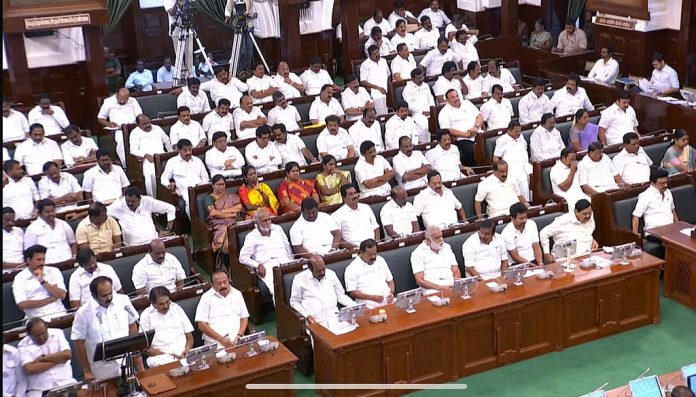Chennai : The Tamil Nadu Assembly passed a resolution on Wednesday opposing the Union government’s Waqf Amendment Bill, citing concerns over political interference and curtailment of religious freedom. The resolution, introduced by Chief Minister M.K. Stalin, called for the complete withdrawal of the Bill, arguing that it undermines the autonomy of Waqf boards and infringes upon the religious rights of Muslims, reported the News minute.
With support from the Dravida Munnetra Kazhagam (DMK), All India Anna Dravida Munnetra Kazhagam (AIADMK), Congress, Viduthalai Chiruthaigal Katchi (VCK), Left parties, and Pattali Makkal Katchi (PMK), the resolution was overwhelmingly passed. However, the Bharatiya Janata Party (BJP) opposed the move and staged a walkout.
Chief Minister Stalin criticized the Bill, stating that it grants excessive control to the Union government while diminishing the authority of national and state Waqf boards. He highlighted key concerns, including:
The potential reclassification of Waqf land as government property.
The requirement that only individuals practicing Islam for over five years can establish Waqf boards.
The formation of separate boards for different Muslim sects.
The removal of election procedures for Waqf board leadership and the mandatory inclusion of two non-Muslims on the board.
The revocation of Section 40 of the Waqf Act, transferring property identification powers from the Waqf board to the Union government.
The elimination of the ‘Waqf by user’ category, which has historically recognized properties based on long-term religious use.
“The Bill aims to dismantle the Waqf board over time. It is an attempt to deceive and suppress Muslims. We must resist it,” Stalin asserted in the Assembly.
Stalin also linked the Waqf Amendment Bill to broader policies of the Union government, stating, “The Citizenship Amendment Act (CAA) deceived Muslims and Sri Lankan Tamils. Hindi imposition harms non-Hindi states. Denial of funds deceives non-BJP-ruled states, while policies like NEET and the National Education Policy (NEP) negatively impact Dalits, Adivasis, and other backward communities.”
The AIADMK’s support for the resolution is particularly significant, coming shortly after party general secretary Edappadi K. Palaniswami (EPS) met with Union Home Minister Amit Shah in New Delhi, fueling speculation of an alliance revival. Meanwhile, Tamil Nadu BJP president K. Annamalai is expected to meet Amit Shah later this week, possibly to discuss the party’s response to the resolution.
While the DMK and its allies remain firm in their opposition to the Bill, the BJP’s walkout underscores the deepening divide between the ruling state government and the Union government over religious and administrative matters. As the Waqf Amendment Bill moves closer to being tabled in Parliament, the political discourse around it is expected to intensify.




